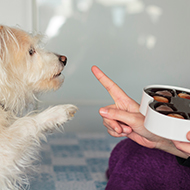
VPIS statistics underscore importance of hiding ’toxic’ treats.
As the Easter festivities get underway, the British Veterinary Association is reminding pet owners to keep toxic traditional treats well out of their pet’s reach.
The warning comes after figures from the Veterinary Poisons Information Service reveal it received more than 100 enquiries about animals eating chocolate last year.
Perhaps unsurprisingly, the figures show half of all enquiries about pets ingesting hot cross buns come at Easter. Eighty per cent of the enquiries related to dogs consuming chocolate, with 15 per cent relating to cats and three per cent to rabbits.
BVA junior vice president Rob Williams said: “Chocolate eggs and hot cross buns are just a few of the treats which spring onto the shelves at this time of year. While they are delicious for us, the VPIS statistics show they are also tempting – but toxic - to our pets.
“Many of us will know the dangers that chocolate presents to dogs, but other pets such as cats and rabbits can also become seriously unwell if they eat it, while hot cross buns also contain vine fruits which is particularly toxic too. It’s best to make sure that all sweet treats and tempting titbits are kept out of reach of your pets to avoid emergency vet visits, but if you think your pet has eaten something they shouldn’t, it’s really important that you speak to your vet – it could save their life.”
The Veterinary Poisons Information Service (VPIS) provides emergency advice to veterinary professionals and runs Animal PoisonLine, a 24-hour specialised emergency telephone service dedicated to helping pet owners.
Image (C) Shutterstock.



 The RCVS has announced a new version of its 1CPD mobile app, with enhanced features for veterinary surgeons and veterinary nurses to record their continuing professional development.
The RCVS has announced a new version of its 1CPD mobile app, with enhanced features for veterinary surgeons and veterinary nurses to record their continuing professional development.